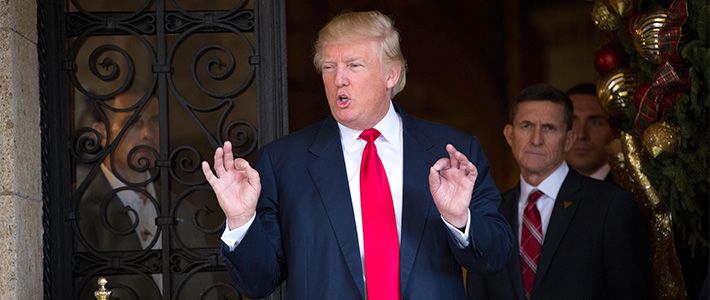
What Trump Portends for Japan-US Relations
1917 Revisited? The International Order in the Trump Era
Politics- English
- 日本語
- 简体字
- 繁體字
- Français
- Español
- العربية
- Русский
A New World Order?
Britain’s vote to leave the European Union and Donald Trump’s victory in the US presidential election made 2016 an unforgettable year. The startling events defied general expectations that the remain vote would prevail and Hillary Clinton be chosen to succeed Barack Obama.
These developments will affect the international order in 2017. Curiously enough, highly significant developments for the global balance of power also occurred exactly a century ago, in 1917, as the United States entered World War I and the Russian Revolution took place. The two events ultimately led to the United States and the Soviet Union facing off as superpowers with opposing ideologies in the Cold War. More importantly, they brought the curtain down on the Concert of Europe, an agreement among the continent’s powers that upheld their prominent place in the international order. By the end of the war, three empires—in Germany, Russia, and Austria-Hungary—were no more.
Taking a long-term historical view can bring the essential nature of the changes of 2017 into sharper focus. In peace negotiations after World War I, US President Woodrow Wilson advocated the basic principle of self-determination and pushed for the establishment of the League of Nations. These were first steps in the construction of a liberal world order based on democracy and international cooperation. This came to fruit in the drawing up of the Atlantic Charter under the leadership of US President Franklin D. Roosevelt and British Prime Minister Winston Churchill during World War II. The liberal international order—protected and reshaped by the United States and Britain—is the basis for the world we live in today.
To date it has addressed such external threats as fascism, communism, and international terrorism. Today, though, the United States and Britain face internal unrest. Citizen revolt handed Trump—an opponent of liberal values—the reins of power in the United States, and fostered Britain’s exit from the European Union, a symbol of international cooperation.
Seen positively, these developments constitute necessary and fundamental reforms of a twentieth-century system that has outlived its usefulness. Yet neither President-elect Trump nor British Prime Minister Theresa May has spoken of building a new international order. All we hear are self-centered slogans about rebuilding the economy, eliminating inequality, and creating jobs.
Republicans Divided
The year 2017 is likely to be an anguished and confused one for American and British politics and the liberal international order. Some of Trump’s supporters are hostile to US allies, Hispanics from neighbor Mexico, and Muslims. Brexit voters regard the EU with animosity, laying their highest priority on getting out and blocking the further influx of immigrants.
The basic foreign policy of the Trump White House will become clearer when he has made all of his political appointments. Despite its majority in both the Senate and the House, the Republican Party today is fractured into traditional internationalists, neocons, and supporters of the Tea Party and America First movements. I cannot see a way to bridge the divide between Trump’s friendly view of Russia and the antagonistic stance of conservative Republican lawmakers. Michael T. Flynn, Trump’s appointee as national security advisor, may also not have sufficient political expertise to reconcile differences in the National Security Council.
While the populist rhetoric of the new president will thrill some Americans in 2017, the lack of a clear foreign policy direction will provoke a cacophony of competing viewpoints, making it difficult to outline a consistent long-term strategy. If a crisis develops, Trump may aggravate the situation with inflammatory tweets, hindering interagency cooperation.
Japan’s Role
As a US ally, Japan will need to show patience and flexibility in responding to a derisive and combative Trump. Fortunately, the country has a politically and diplomatically stable government under Prime Minister Abe Shinzō. Japan must take on a greater leadership role to maintain the liberal international order. It is important to cooperate with the United States by listening to the views of the new administration and showing a degree of understanding for them, while simultaneously working with Washington to promote policies to establish peace and stability in the international community. This will hopefully encourage the United States to return to a more cooperative and moderate foreign policy.
(Originally published in Japanese on January 13, 2017. Banner photo: President-elect Donald Trump [center] speaks to reporters after discussing military spending with arms industry leaders and Department of Defense officials in Palm Beach, Florida, on December 21, 2016. Behind him is Michael Flynn [center right], his choice for national security advisor. © Kevin D. Liles/New York Times/Aflo.)